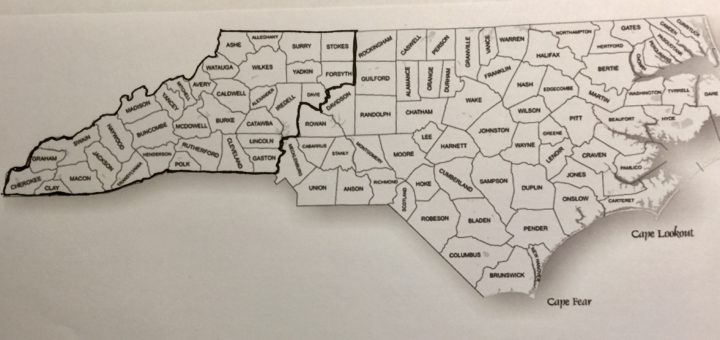BY LINDA CONNOR KANE
On Dec. 5, several Asheville residents opened The New York Times to see a front-page story headlined “2 New Yorkers Erased $1.5 Million in Medical Debt for Hundreds of Strangers.”
The article details how two women from Ithaca, N.Y., with the assistance of New York-based nonprofit RIP Medical Debt, purchased and forgave the medical debt of hundreds of people around the state of New York.
“When I read The New York Times article, I was immediately interested in helping our neediest friends and neighbors in Western North Carolina,” says local resident Mignon Durham.
Working with Durham — along with local resident John Fritchie, plus the folks behind Asheville business ZaPow! gallery and the Farm at Green Heron Pond in Leicester — we reached out to RIP Medical Debt. The national nonprofit’s mission is to purchase medical debt from bill collectors and then work on behalf of individuals, foundations and corporations to abolish medical debt and provide relief for those in need.
Once the group contacted RIP Medical Debt, its in-house research team determined the amount of debt in each of 34 Western North Carolina counties, an area from Gaston County northeast to Stokes County and west (see map below). The total: about $1.5 million. The steering committee has agreed to raise $15,000 to address this debt for these 34 counties. Any funds raised beyond that figure will be applied to RIP Medical Debt’s national veterans program.
“Knowing that a donation to our campaign will remain local and that every dollar you give has the purchasing power of $100, our $15,000 goal should be very realizable,” adds Durham. “Until we can rework the health care system in America, this is one important way to relieve the stress and unintended consequences of needing medical care today.”
Medical debt is a significant part of overall health issues for Americans. “Many people take on extra jobs or hours to afford health care, and 11 percent of Americans have turned to charity for relief from medical debts, according to a 2016 poll conducted by The Times and the Kaiser Family Foundation,” the Times article noted.
An early donor to our campaign, Rebecca Heartz, reflects on the problem: “Every day, I hear stories of people facing financial ruin because of an illness or accident requiring medical [care] they cannot afford. I watched my own mother, who lived to age 92 with dementia, exhaust her assets paying for care in a memory facility. I hope to help ensure that the desperation this causes patients and their families does not happen to others. This effort will also create awareness of the systemic changes that are needed in the health care delivery system in our country.”
Across the country, these statistics provided by RIP Medical Debt offer a sobering picture of medical debts effects on our country:
• More than $100 billion in unpaid medical debt every year has an adverse impact on debtor patients, physicians and hospitals.
• Six in 10 of both insured and uninsured people say they have difficulty in paying other bills as a result of medical debt. Over a third were unable to pay for food, heat or housing because of medical bills.
• Nearly two-thirds of U.S. adults under age 65, or 116 million people, had medical bill problems or debt, went without needed care because of cost, were uninsured for a time or were underinsured — insured but had high out-of-pocket medical expenses or deductibles relative to income.
• Medical debt contributes to more than 60 percent of the bankruptcies in the U.S. Until satisfied, debt lingers on a person’s credit report to negatively impact their ability to buy a home, get a loan or even gain employment.
Once the group has reached its goal, RIP Medical Debt will purchase the debt, and the funds will be used to pay the debts of individuals in Western North Carolina who earn less than 200 percent of the federal poverty level, those in financial hardship and people facing insolvency.

There are no tax consequences for those whose medical debts are forgiven because the payment funds are from a detached and disinterested third party (RIP), so forgiveness of the debt is not considered income to the gift recipient. In addition, RIP Medical Debt contacts the credit reporting agencies for the recipients, and this debt is removed from their credit reports.
In this campaign, dollars go a long way: One dollar abolishes $100 of debt! For every $25 given, $2,500 of debt is erased. One hundred dollars forgives $10,000 of debt. One hundred percent of donations go toward abolishing medical debt. RIP Medical Debt has other funding sources for its overhead and administrative costs.
As noted in The Times article, two former debt collection industry executives, Craig Antico and Jerry Ashton, founded RIP Medical Debt in 2014. Through personal data associated with the debt accounts, they are able to target specific classes of people, such as veterans, to relieve their debts.
Their efforts were greatly enhanced in 2016 when John Oliver did a segment on his HBO show “Last Week Tonight,” As reported by The Times, Oliver “paid $60,000 to forgive $14.9 million in medical debts through the charity. About 9,000 people received the yellow forgiveness envelopes as a result.” So far, the nationwide efforts have abolished $500 million in debt on the way to RIP’s efforts to reach $1 billion of medical debt forgiveness.
To celebrate the effort, join the organizers for a party at ZaPow! on Thursday, March 7, 5:30-7:30 p.m. at 150 Coxe Ave., Suite 101, Asheville. Go to ZaPow.com for updated information. A party to thank donors will take place at the Farm at Green Heron Pond on Sunday, April 28, 2-4pm.
Fairview resident and retiree Linda Connor volunteers for a number of nonprofit organizations that are focused on literacy and social justice issues.





Before you comment
The comments section is here to provide a platform for civil dialogue on the issues we face together as a local community. Xpress is committed to offering this platform for all voices, but when the tone of the discussion gets nasty or strays off topic, we believe many people choose not to participate. Xpress editors are determined to moderate comments to ensure a constructive interchange is maintained. All comments judged not to be in keeping with the spirit of civil discourse will be removed and repeat violators will be banned. See here for our terms of service. Thank you for being part of this effort to promote respectful discussion.